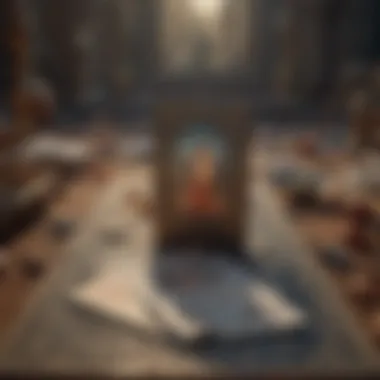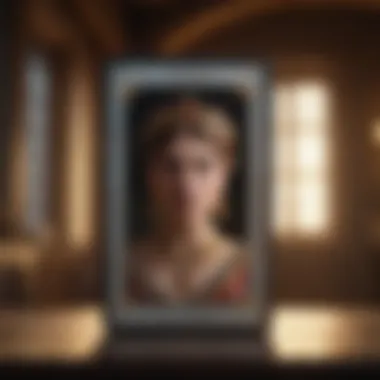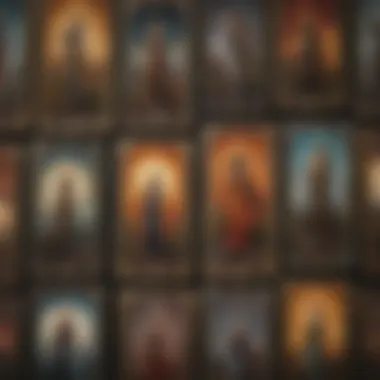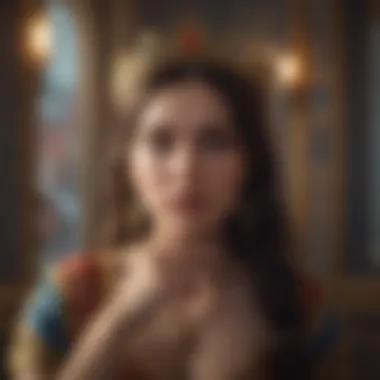The Intricacies of Free Tarot Readings: Unveiling Facades


Intro
The exploration of free tarot card readings opens a myriad of inquiries and possibilities. It suggests a space where curiosity meets spirituality, yet veils the complexities that often such offerings carry. Individuals may seek out free readings for diverse reasons, from a casual interest to a deep desire for guidance. However, the implications of seeking tarot readings without cost extend beyond mere curiosity. It raises questions about the authenticity of the experience, the motivations behind the readers, and the mental frameworks of the querents.
The digital evolution has further transformed the tarot landscape. Many people now find tarot readings accessible through numerous online platforms, which offer services that range from automated readings to personalized sessions. This changing environment complicates the understanding of tarot as a spiritual or psychological tool. Therefore, it becomes essential to navigate the nuances of free services, the quality of insights provided, and the profound importance of self-discovery within these readings.
Understanding the Zodiac
Overview of Zodiac Signs
Zodiac signs play a pivotal role in the realm of tarot and astrology. Each sign corresponds to specific traits, energetic frequencies, and influences that can inform tarot interpretations. The Zodiac consists of twelve distinct signs, encompassing both the personal and collective experiences of individuals.
Sign Traits and Characteristics
Each zodiac sign carries unique characteristics:
- Aries: Energetic and assertive
- Taurus: Patient and determined
- Gemini: Curious and adaptable
- Cancer: Intuitive and nurturing
- Leo: Confident and expressive
- Virgo: Analytical and practical
- Libra: Diplomatic and harmonious
- Scorpio: Intense and passionate
- Sagittarius: Adventurous and optimistic
- Capricorn: Disciplined and responsible
- Aquarius: Innovative and independent
- Pisces: Compassionate and artistic
Elemental Qualities
The elements associated with each sign—Fire, Earth, Air, and Water—serve as foundational aspects of personality. Understanding these associations can enhance the interpretation of tarot readings when linked with astrology. For instance, fire signs often resonate with dynamism, while water signs delve into emotional realms.
Astrological Insights
Current Astrological Trends
Understanding current astrological trends can provide context for tarot readings. These trends influence collective energies, offering a backdrop that readers should consider when interpreting cards.
Influence of Celestial Events
Celestial events, such as retrogrades or eclipses, hold significant meanings that should not be overlooked. They shape the energies surrounding tarot inquiries, often enhancing or obscuring clarity in a reading.
How to Interpret Your Birth Chart
Your birth chart serves as a numerical map of your unique astrological placement. Learning to interpret it can offer deeper insights into your personality, relationships, and potential life paths.
Horoscope and Predictions
Monthly or Weekly Forecasts
Consulting horoscopes can align with tarot practices. Readers can correlate monthly or weekly forecasts with cards drawn, providing a more comprehensive understanding of individual circumstances.
Personalized Horoscope Reading
Personalized horoscope readings can further inform tarot interpretations, making the cards more relatable and relevant.
Compatibility Readings based on Zodiac Signs
Compatibility readings can be enriched through a combined understanding of tarot and zodiac interactions. They highlight how different signs interact energetically, offering deeper insights into relationships.
Free tarot readings should be approached with discernment. Quality can vary widely, and understanding the underlying factors improves the experience and outcome.


Understanding Tarot Cards
Understanding tarot cards is essential for anyone interested in the practice of tarot reading. Tarot cards serve as symbolic tools that help individuals connect with their subconscious thoughts and feelings. They provide insights into various aspects of life, allowing users to explore questions about their relationships, career, and personal growth. The significance of grasping the intricacies of tarot cards cannot be overstated, especially in the context of free tarot readings, where the quality and accuracy of the interpretation can significantly vary.
The History of Tarot
The history of tarot is fascinating and deeply intertwined with the evolution of human spirituality. Tarot cards are believed to have originated in 15th-century Italy as a card game called tarocchi. Over time, they transformed from mere entertainment to a profound tool for divination and self-reflection. The first known decks were created for nobility, but the esoteric meanings began to develop in the late 18th century when occultists began to assign deeper symbolic interpretations to the cards. Historical insight enriches our understanding of the cards, and assessing their origins can clarify why they are viewed as significant in spiritual practices today.
The Structure of a Tarot Deck
A standard tarot deck consists of 78 cards, divided into two main sections: the Major Arcana and the Minor Arcana.
- Major Arcana: This part consists of 22 cards that depict pivotal life events and spiritual lessons. Cards such as The Fool, The Lovers, and The World carry immense significance in readings, often representing major themes of one's life journey.
- Minor Arcana: This section is made up of 56 cards divided into four suits: Cups, Pentacles, Swords, and Wands. Each suit represents different facets of human experience. For instance, Cups relate to emotions, while Wands represent creativity and action. Understanding the structure of a tarot deck is crucial for interpreting readings accurately.
Interpretation of Tarot Cards
Interpreting tarot cards requires a blend of intuition, knowledge, and context. Each card conveys specific meanings, but these meanings can change based on their placement in a spread and the question posed by the querent. Readers often use predefined spreads, such as the Celtic Cross or Three-Card spread, each offering various perspectives.
Moreover, the interplay between the cards can provide richer insights. For example, drawing the Ten of Swords alongside the Sun could imply overcoming adversity through personal strength. The reader's ability to grasp these nuances plays a vital role in the overall quality of the tarot reading experience. Thus, understanding how to interpret the cards effectively is indispensable, particularly in settings where people access free tarot readings that may lack depth and personal connection.
What Free Tarot Card Readings Entail
Understanding what free tarot card readings entail is crucial for anyone exploring this esoteric practice. It provides insights into the offerings available and the considerations that need assessment. Free tarot readings often attract individuals seeking spiritual guidance without financial commitment. However, it is essential to recognize that the value and quality of such readings can vary significantly.
Types of Free Tarot Offerings
There are various types of free tarot offerings that one may encounter. Each type has unique characteristics and appeal, and being aware of them can help users make informed choices:
- Online Tarot Readings: Many websites offer automatic tarot readings. These services often use algorithms to generate readings based on user input. While convenient, they can lack the personal touch of an experienced reader.
- Social Media Services: Platforms like Facebook and Reddit host numerous tarot readers who sometimes offer free sessions as a means of attracting attention. Users can find groups dedicated to tarot reading, where members indicate their willingness to provide readings in exchange for feedback or practice.
- Free Trials: Some professional tarot platforms offer free trials. These may allow users to experience a limited-time session with a seasoned reader. However, these often come with the expectation of promoting their full services afterward.
- Local Events and Gatherings: Local spiritual & esoteric events often feature free tarot reading booths. While these provide an excellent opportunity to engage with seasoned readers, it's often challenging to find deeper insights during a brief session.
Recognizing these different types allows readers to navigate their options better and choose the reading fitting their needs.
Accessibility in Free Tarot Reading
Accessibility plays a vital role in understanding the landscape of free tarot readings. The nature of these services makes them readily available to anyone with internet access or those attending local events. This ease of access broadens the audience for tarot card readings, making them more inclusive.
However, this accessibility leads to certain complexities:
- Inclusivity: Free tarot readings can help demystify tarot for individuals unfamiliar with the practice. By removing financial barriers, more people can explore their spirituality. This may promote a greater understanding of tarot as a tool for self-reflection.
- Quality Concerns: While accessibility can encourage participation, it can also dilute the overall quality. With free services often lacking in depth and experience, individuals may not receive valuable insights or guidance.
- Reputation Issues: Not all readers have the same motivations. Some may genuinely want to offer help, while others might seek to exploit the free service for personal gain. This disparity can affect how people perceive the value of tarot overall.
By examining accessibility, individuals can better appreciate both the opportunities and challenges inherent in free tarot readings.
The Facade of Free Services
Understanding the facade behind free tarot card readings is central to comprehending the complexities involved. This section investigates the multiple layers that influence the provision of free tarot services, which are often shrouded in misconceptions and unexpected dynamics. Recognizing these factors is crucial, particularly for astrologers and tarologists who engage with clients seeking clarity and understanding.
Motivations for Offering Free Readings
Different motivations drive individuals or platforms to offer free tarot readings. First, some tarot readers provide free services as a means of exposure. By doing so, they aim to build a clientele that, in turn, might lead to paying customers in the future. This practice often creates a paradox where quality may be compromised for quantity in seeking engagements.
Second, the intention behind giving free readings can stem from a genuine desire to help others. Some readers believe in accessibility to spiritual tools and may wish to provide comfort during challenging times without the barrier of cost. However, this altruistic view can sometimes overlook the value of the reader's time and expertise.
Lastly, promotional strategies also play a significant role. Competitors within the tarot reading space may offer free services to entice users away from other platforms or readers. This strategy can create a market saturation effect, complicating the landscape for both seekers and other readers.


Perceived Value vs.
Actual Quality
When engaging with free tarot services, there exists a gap between perceived value and actual quality. Many users associate the act of receiving a reading without charge with lower quality. This assumption can arise from experiences of poorly executed readings or superficial interpretations without deeper insights.
Nevertheless, it is essential to highlight that this does not universally apply to all free readings. While some offerings may lack depth, others can deliver profound insights. Understanding this dichotomy requires critical engagement by users. They must discern the skill level and approaches of the readers they encounter.
The perception of value is often influenced by individual expectations rather than the inherent quality of the reading itself.
User Experiences with Free Services
User experiences can vary significantly with free tarot readings. Some individuals may find their sessions enlightening and valuable, leading to personal reflections and positive outcomes. These instances often occur when the reading resonates on a personal level, triggering something in the querent's psyche.
Conversely, there are users who emerge from these experiences feeling disillusioned. Negative experiences can stem from a lack of professionalism or vague responses lacking substantial advice or guidance. Such feelings of disappointment highlight the need for a more informed approach to seeking free services.
In summary, while free tarot readings can offer appealing access, they also come with inherent risks. Users must navigate this landscape with a critical perspective, weighing both the motivations behind such offers and the varying quality they might encounter.
The Psychological Aspects of Tarot Readings
The intersection of psychology and tarot readings deserves careful consideration. Understanding this relationship is crucial in unraveling the complexities associated with free tarot card readings. Individuals often seek tarot readings to gain insights into their personal lives. They look for answers to questions that weigh heavily on their minds or guidance during times of uncertainty. This search for clarity can trigger various psychological responses. Acknowledging this can aid both readers and querents in navigating their experiences more effectively.
Self-Discovery and Reflection
Self-discovery is a significant aspect of tarot readings. Each card drawn during a session can serve as a mirror reflecting the querent's inner thoughts and feelings. The imagery and symbolism present in the cards often provoke deep personal reflections. Individuals may find themselves confronting truths they previously avoided. This confrontation is not merely about understanding the cards but also about engaging with oneself.
In free tarot readings, this process can be both enlightening and complicated. Without financial investment, one might approach readings with less pressure. This can foster a more open mindset. However, it can also diminish the perceived value of the insights gained. Readers must thus encourage querents to embrace these moments of reflection, regardless of whether the service was paid or free.
The Role of Expectation in Readings
Expectation plays a vital role in the tarot reading experience. Many seekers enter sessions with specific hopes or desires, often envisioning desired outcomes. These preconceptions can heavily influence how they interpret the cards. When a reading does not align with expectations, it may lead to dissatisfaction or confusion.
Tarot readers should consider this aspect carefully. It is essential to manage expectations by being clear about what a reading can achieve. Free tarot readings may appeal to a wider audience, but those seeking profound insights might be misled if they do not understand the limitations inherent to such services. Adequate communication around expectations can mitigate potential misunderstandings and create a healthier dialogue between readers and querents.
Dealing with Disappointment
Disappointment is often an inescapable part of tarot readings, especially in free services. When a querent receives insights that do not resonate with their life's reality, they may feel disheartened. Understanding how to process this disappointment is crucial for both querents and readers.
Readers should approach feelings of disappointment with empathy. They can encourage querents to reflect on the reading as a part of a larger journey rather than a definitive outcome. Sharing strategies for coping with disappointment can be beneficial. Suggestions may include journaling, discussing feelings with a trusted friend, or revisiting the reading after some time has passed.
Navigating the feelings of disappointment can open the door to new understandings, paving the way for growth and self-improvement.
Collectively, these psychological aspects shape the experience of not just tarot reading, but also a person’s journey towards self-awareness. By addressing these elements, both readers and seekers can derive more meaning from their interactions, paving the way for deeper exploration and personal development.
Digital Platforms and Tarot Readings
Digital platforms have fundamentally transformed the landscape of tarot readings and accessibility. These platforms enable readers to reach a wider audience, breaking geographical barriers that once confined clients to local practitioners. In this article, we explore the implications of online offerings and how they alter the tarot reading experience.
Emergence of Online Tarot Services
Online tarot services have surged in popularity in recent years. Many websites and applications now offer free or low-cost tarot readings. These services cater to a diverse audience, including those who are new to tarot as well as seasoned enthusiasts. The convenience of accessing these readings from home contributes significantly to their appeal. People can explore their curiosities without the commitment of in-person sessions.


Additionally, online services often provide various formats for readings. For example, users can select one-card readings, three-card spreads, or more complex layouts at their fingertips. With this variety, individuals can tailor their experience to their specific needs and preferences.
Impact of Technology on Traditional Practices
Technology has undeniably influenced traditional tarot practices. While it presents opportunities for enhancing accessibility, it also raises questions about authenticity and integrity. The shift to digital mediums means interpretations are sometimes simplified. Instant readings may lack the depth and connection found in face-to-face encounters.
Furthermore, reliance on algorithms for tarot readings can lead to a mechanical approach. This detachment may obstruct the intuitive aspect many practitioners value in tarot. As a result, both readers and querents must navigate a new landscape where technology shapes interactions.
Evaluating Online Free Tarot Services
With a variety of free online tarot services available, discerning quality becomes paramount. Users should consider several factors when engaging with these platforms:
- User Reviews: Checking the experiences of others can provide insights into the effectiveness of the service.
- Credentials of Readers: Understanding the background and experience of the tarot reader can enhance the reading's reliability.
- Client Support: A responsive support team indicates a commitment to user satisfaction.
It’s essential to approach online tarot readings with a critical eye. Not all free services provide the same level of insight or care. Evaluating these elements can aid users in navigating the complexities of free tarot card readings and help them seek more substantial connections in their tarot journey.
Engaging with tarot online can open doors to self-discovery. However, critical evaluation remains key to ensuring meaningful interactions.
Ethics and Responsibility in Tarot Reading
In the realm of tarot reading, ethics and responsibility hold significant weight. They act as the foundation upon which trust and credibility are built between the reader and the querent. Understanding the ethical implications is essential, especially in environments where free tarot readings are prevalent. Readers can easily misrepresent their abilities, leading to potential harm or disappointment for seekers of insight.
- Importance of Professionalism
Professionalism among readers promotes a standard of quality in tarot reading. When a tarot reader approaches their practice with integrity, it enhances the overall experience for the querent. Readers should possess not only a sound knowledge of tarot but also a clear understanding of personal boundaries and the psychological impact of their readings. This professionalism fosters a culture where the spiritual well-being of the querent is prioritized.
"The integrity of the reader significantly influences the querent's perception of their experience."
Professionalism Among Readers
Professionalism involves a commitment to ethical behavior and respect for the querent. Readers should maintain a level of decorum in their interactions, even when offering free services. They must avoid making guarantees or promises about specific outcomes. Instead, tarologists should focus on delivering thoughtful insights, grounded in their knowledge and experience. This can lead to an informed exploration of the querent's concerns and questions. A responsible tarot reader practices discernment in their communication, ensuring they do not exploit emotional vulnerabilities, which is particularly crucial in free readings.
Consent and Boundaries in Readings
Consent is a foundational element of any ethical tarot practice. Readers must clearly communicate the nature of their services and obtain the querent's consent before proceeding with the reading. This includes discussing the methods used and any potential emotional impact. Boundaries play an equally critical role in ensuring a respectful exchange. Readers should delineate the scope of their readings and refrain from offering personal advice that transcends their expertise. By establishing and honoring these boundaries, both the reader and the querent can interact in a safe and constructive manner.
The Reader-Querent Relationship
The relationship between the reader and the querent is delicate and should be approached with care. This dynamic greatly influences how readings are perceived and received. A responsible reader encourages open dialogue and invites questions, which fosters a collaborative atmosphere. Furthermore, the reader should be aware of their role as a guide, not an authority figure. This differentiation ensures that the querent retains autonomy and trust in the process. Maintaining this balance ultimately leads to more meaningful and fulfilling interactions.
Future Trends in Free Tarot Readings
Understanding future trends in free tarot readings is crucial for those involved in this practice. It provides insight into how these services may evolve amidst changing societal dynamics. As free offerings gain traction, they can significantly impact accessibility and the overall experience of tarot readings.
New Formats and Adaptations
The landscape of tarot readings is changing. As digital media becomes increasingly dominant, new formats are emerging. People are exploring interactive tarot experiences perhaps through apps or online platforms that utilize video. Here, users might engage with readers from remote locations. This adaptation accommodates a demand for immediacy.
Additionally, social media has transformed how tarot is shared and consumed. Live streams and stories on platforms like Facebook and Instagram create real-time interaction. Questers can receive readings while engaging with communities that might resonate with their situations. This development not only broadens the audience but also creates a sense of belonging in what is often a solitary endeavor.
Integration of Artificial Intelligence
Artificial intelligence (AI) is now entering the realm of tarot. Many online platforms are adopting AI technology to create personalized readings for users. These algorithms analyze user data and preferences to generate tailored experiences. While this can enhance the ease of access, it raises questions about authenticity. Can a machine convey the depth of human intuition?
Despite the potential loss of human connection, AI can facilitate a unique level of engagement. For instance, instant readings can now cater to a wider audience, accommodating those who may feel intimidated by traditional readers. The incorporation of AI in tarot readings represents both an evolution and a challenge for the practice's traditional roots.
Community Engagement and Development
The future of free tarot readings also hinges on community engagement. As online spaces flourish, forums and groups offer platforms for individuals to share experiences and insights. Websites like Reddit have categories solely for tarot discussions, fostering a supportive environment. The participatory nature of these communities enhances the learning experience
Moreover, many readers are choosing to operate in a less hierarchical structure, where knowledge and support flow among individuals rather than from a single source. This democratization of information can lead to varied interpretations and personal connections that enrich the tarot experience. Such community-driven efforts can ultimately enhance the reliability and quality of free tarot services.







